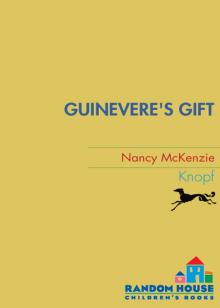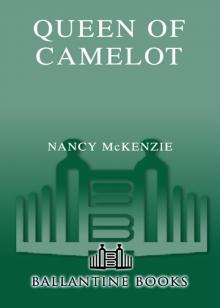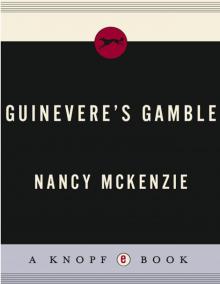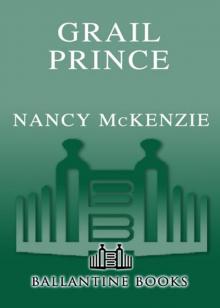- Home
- Nancy McKenzie
Grail Prince Page 22
Grail Prince Read online
Page 22
“Look!” Marrah cried suddenly, pointing with a shaking finger at the lake. Even as they watched, a warm mist rose off the cooling water and thickened, gathering strength. Her voice rose to a nervous shriek. “It’s coming for us!”
“Don’t be ridiculous,” Galahad said sharply. “It’s only mist.”
Percival cleared his throat as the mist rolled off the water and up the reed-lined shore to where they stood. “Well,” he ventured, “there’s mist, and then there’s mist.”
They turned, startled by the frantic hammer of hoofbeats. Garfalon rounded the far wall, bent low on his pony’s neck. “My lord! My lord!” He pulled up, breathless. “My lord, let’s be gone, and quickly! There’s a great mist rising! Oh!” He gasped sharply as he looked toward the lake. “And another one falling!”
“Another one?” Percival croaked.
“Aye. Look yonder.” He pointed behind them to the castle, where a feathery whiteness descended from the dimming sky. Already the tops of the stone towers were lost to view. The horses shifted edgily, tossing their heads. Marrah whimpered.
Galahad turned to Garfalon. “What did you see along the wall?”
“No gate, my lord. There’s a ditch dug most of the way around, and water in it, too. At the back it runs right up to a cliff. The only place to scale the wall is here.” He gulped audibly. “And I pray you won’t try it, my lord. I’ll wager there’s something nasty waiting on the other side.”
The first cold fingers of mist drifted between them. The mule snorted, rolling the whites of its eyes.
“Sir Brastias may like his privacy,” Galahad muttered, “but we come in peace. He has no reason to keep us out.” He raised a shout and heard his voice echo off the hills. Silence followed. The mist thickened visibly, rolling by in solid clumps, clogging their nostrils and throats, blinding their eyes.
“Please, my lord,” Marrah begged. “Let us camp farther down the valley. We can try again in the morning.”
“What makes you think it will be any different then?” Galahad turned back to the wall, which he could barely see, though it was less than a horse’s length away. “Ho! Sir Brastias! We come in peace! We are four only, and one a woman, Sir Ulfin’s daughter from the Chapel in the Green. We have news, and need of help. We will pay for a night’s shelter and a hot meal.”
Nothing stirred. Then suddenly they heard movement behind them in the water, in the reeds, a soft rustle and a low chorus of frogs. The mule brayed, backing wide-eyed, and Marrah cried out as frogs swarmed up from the lake and surrounded them, thick upon the ground, a shifting, hopping carpet of green, silver-eyed creatures all croaking and calling at once.
“Mother of God!” Garfalon cried, struggling to keep the pony and mule from bolting.
“They’re only frogs,” Galahad said sternly. “Hold hard to your horse, Percival, and force him to be still. He thinks the ground has come alive. Get his attention off the frogs and onto you.”
Percival managed to control the gray, and Garfalon held tight to both sets of reins. Eventually the frogs returned to the lake as mysteriously as they had come. “It’s that damned enchanter!” Garfalon quavered. “He called them forth!”
“Frogs!” Galahad snorted. “He must be jesting.”
Marrah whimpered. “If we don’t leave, what will be next?”
Galahad shouted again and asked for entrance, and again nothing stirred in the shrouded night. The white wall glittered in the shifting fog and Galahad’s stallion skittered nervously.
“Easy, Rouk. What is it?”
Percival’s voice trembled. “I’ve never seen a moment’s fear in that horse before. He didn’t move a muscle at the frogs.”
“He’s not afraid of frogs. Snakes worry him, but that’s all.”
A shriek issued from the fog. “Look!” Marrah cried. “Snakes!”
Galahad stared, blinked, and stared again. Sinuous dark shadows slithered over the wall and down to the ground, hundreds of them! The stallion danced and the other horses fidgeted uneasily. Galahad drew his sword, a flash of light in the mist, and lifted one of the snakes onto the blade. The stallion shuddered, backing, as the ground around his hooves silently writhed and glittered.
“For pity’s sake!” Galahad cried. “Garden snakes!” He pushed the stallion forward to a standstill. “A silly, common trick, that’s all it is. And it means that someone’s on the other side of that wall. Hallo! We come in peace!”
For a long while no one answered. Then finally a voice came dimly out of the mist. “Put up your sword.”
Galahad shook the snake off the blade and sheathed his sword. How could anyone see them, when they could see nothing themselves? “In the name of God, in the name of Arthur, who will come again, have the courage to meet me face-to-face. I will do you no harm.”
They stood silently in the rolling mist, waiting for something to happen. The snakes disappeared quickly into the long grass and the horses stood still. Gradually the mist began to thin and draw back along the wall, and as it withdrew a man appeared, suddenly and completely, where the mist had been. They all cried out together and Galahad’s sword whipped from its scabbard of its own accord.
The man, wrapped from head to toe in a brown monk’s robe, pointed to the blade. “Is this how you come in peace? Then you may go back again.” And he began to turn away.
“Stay!” Galahad cried. “My hand moved faster than my thought, that’s all! You startled us. See, it is sheathed again now.”
The robed figure turned back to them. “Is this all of you? Where are your men? Your supplies?”
“We’ve no men. The mule carries our supplies. We are travelers, except for Marrah, Sir Ulfin’s daughter. He was killed last night by bandits. We buried him this morning and brought her with us. She cannot stay there alone.”
“I didn’t know Sir Ulfin had a daughter.” The man lifted a hand and pushed back the hood of his robe. He was young and fair-haired, with broad shoulders and a warrior’s carriage beneath the robe. “I see no wounds upon you.”
“We were not there when they attacked him. But we killed them afterward. Every one.”
“Was the leader a big, dark-bearded brute with a piece out of his ear?”
“Indeed,” Galahad said sharply. “Do you know him?”
The young man grimaced. “Hardly. They attacked us first, and then must have headed over the ridge. A bloodthirsty group, they looked. I am sorry to hear about Sir Ulfin. My father will be distraught.” He drew off the robe and stood before them in full fighting gear, heavy leather leggings studded with brass and a shirt of mail, finely linked and flexible, over his tunic. At his hip the hilt of his sword gleamed silver in the dusk. He bowed politely. “My name is Kynor. Sir Brastias is my father. On his behalf I welcome you all to Castle Noir.”
Galahad slid off his horse and introduced his companions. Kynor bowed to each, but took Marrah’s hand in his own and raised it to his lips. “I am so sorry to hear of your father’s death. I deeply regret sending those ruffians away instead of fighting them myself, as I wished to do. We never thought they would find the Chapel in the Green. So few ever have.”
Marrah blushed and then paled. “Thank you, my lord.”
“What made them leave?” Percival asked. “The frogs or the snakes?”
Kynor grinned. “Neither. He only uses frogs and snakes with women. It was the moving wall that sent them howling into the night.”
“The moving wall?” they all repeated together.
Kynor smiled. “Aye, the wall moves. That’s why it’s built so. If men try to scale it, it moves with a thunderous roar. I’d love to show you how it works, but I’m forbidden. You touched it”—he turned to Galahad—“but you also called out for entrance in Arthur’s name. Had you not done so, I would not be standing here.” He turned away. “Come. Follow me.”
Kynor headed into the woods beyond the lake until he reached a hillock covered with holly and blackthorn. He pulled some tangled growth aside, revealing a gr
eat, rounded door in the side of the hill. It led to a tunnel dug beneath the wall, floored in stone and supported by columns of wood, tall enough to lead a riderless horse through.
“Unfortunately,” Kynor said, “you can’t ride through it. A great shortcoming, to my mind, but I was only a child when my father built it and he did not ask for my advice.”
“Sir Brastias built this?” Galahad stared at it in wonder.
“Yes. When he designed and built the wall.” Kynor winked. “This is the gate you were looking for.”
They came out of the tunnel into a broad, paved courtyard flanked by the wooden house and a square stone tower, and lit by slatted lanterns slung on posts. A servant appeared to take charge of their horses and Garfalon went with him. Kynor led the way up broad, shallow steps to a pair of carved oak doors. He paused before them and pressed his hand against the lintel. With a groan, the doors swung inward of their own accord.
They walked into a large hall brilliant with light. Tapestries woven in the golden days of Arthur adorned the walls; rich, imported carpets covered the tiled floor; the carved chests were inlaid with glazed enamels and banded in silver; cushions of bright needlework decked benches and chairs; and thirty candlestands, in bronze, silver, and even gold, held aloft a hundred blazing candles. In the center of the hall stood a wide bronze kettle filled with logs but unlit.
Galahad, Percival, and Marrah stood blinking at the wealth such magnificent furnishings and profligate use of candles implied.
Kynor sighed. “It isn’t necessary, Father. It’s just wasteful.”
“Oh, but I think it is,” a voice replied. In a corner of the room, in the only shadows, a narrow stair twisted upward. Halfway down this stair a tall man in a monk’s robe stood perfectly still. “We must honor these guests, Kynor. One of them is our kinsman, and the other—did you see the shield he carried slung across his stallion’s back? No, I thought not. Then you don’t know who he is.”
“This is Galahad,” Kynor replied, with an edge to his voice. “And this is—”
“Yes,” the voice interrupted, a peremptory voice, used to command. “That was the name.”
Sir Brastias came down the stairs and into the light. The resemblance to Kynor was clear in the straight features, broad shoulders, and carriage. But the older man wore his coarse, brown robe with the ease and familiarity of daily living, not as a cover for something else. He had a mane of rich, brown hair going gray at the temples, and a beard already more gray than brown. The ring he wore on his right hand, a black stone set in gold, was his only ornament. His eyes were unsettling. To suit his coloring they should have been brown like Kynor’s, but they were silver-gray and utterly unreadable, more mirrors than eyes. Galahad shifted uncomfortably as they gazed at him.
Suddenly Brastias smiled, and the room warmed. “Welcome, Prince Galahad. You are Lancelot’s son. I remember your father well. I fought with him when the kingdom was green and we were young, before I gave up the arts of war. He saved my hide at the battle of Agned. And he made me knight. A more honorable man I have never had the pleasure to know. You honor me by coming to my house.” He bowed.
“Lancelot’s son!” Kynor stared. Marrah gaped in awe and crossed herself quickly.
Galahad returned the bow. “Thank you, my lord,” he said stiffly. “You honor us by sharing your house with us tonight.”
A glint of amusement flashed in the silver eyes, and was gone. “I wouldn’t have missed it. Besides, you called on me in Arthur’s name and I could not deny you.” He turned to Percival and held out open arms. “Percival of Gwynedd—my nephew, by all that’s holy!”
Before he knew what was happening, Percival found himself wrapped in a bear hug. “Uncle?”
Sir Brastias laughed. “You’ve never heard of me, I have no doubt. But your mother, Anet, is my sister, and nearest to me in age of all our father’s children. She was last born of the twelve and sent to a nunnery as soon as she could talk. She’ll not remember me, but I remember the day our brother Hapgar gave her to Maelgon of Gwynedd.” He slapped Percival gently on the back. “Tell me, have I any other kin in Gwynedd I should know about?”
“My sister Dandrane.” Percival gulped. “My twin.”
“Twins, eh? They run in the blood of Strathclyde. I was sorry to hear of Maelgon’s death. But what are you doing so far from home if you are now king in his stead?”
Percival flashed Galahad a quick look and flushed lightly.
“Ah, it’s like that, is it?” Sir Brastias nodded slowly. “And who has usurped your place, young prince? One of my wild kinsmen, or one of your own?”
“My father’s brother, Peredur.” Percival licked his dry lips. “He’s not really king—he’s only regent. Until I’m fifteen.”
A sad smile flickered over Brastias’s features. “Gone are the days when boys could afford such innocence. Gone with the greatest king the world has ever known.” He sighed. “No, lad, he is king, not regent, for you cannot go back without his leave. Accept your fate or fight it, but at least know it for what it is.”
Percival nodded dumbly and Sir Brastias turned to Marrah. “And who might you be, child?”
Kynor stepped forward. “This is Sir Ulfin’s daughter, Father. Those bandits we sent away yesterday found their way to the chapel and killed Sir Ulfin. These young lords have brought Marrah to us for safekeeping.”
Brastias’s face went utterly still and the light left his eyes. He took Marrah’s hand and held it between his own. “May God forgive me. Not for all the world would I have sent death to Ulfin. He was a good man, with a generous heart and a tongue that abhorred a lie. God rest his soul and bring him peace.”
“Thank you, my lord,” Marrah said in a small voice. But the gray eyes looked beyond her into a distance none of them could see.
“I should have foreseen it,” Brastias said softly. “He died because his time had come. The Shield had no more need of him.” He turned, his gaze narrowing to focus on Galahad. “It was your coming, Galahad, that made it so. For you are the Knight of the Shield.”
Galahad straightened. “I did not kill him! I was in the forest with Percival. We killed his murderers. Ask Marrah.”
“Be easy, son.” Brastias’s voice was low and kind, the master’s caress on the raised ruff of his hound. “No blame attaches to you. It is a thing beyond your will, and certainly beyond your power. Think no more of it than of the tide turning. Inevitable change. Even predictable, to those with the means to know.” A furrow appeared in his brow. “If you wish to blame someone, blame me. I should have seen it coming. The signs were there. But I was too . . . distracted . . . to read them.” He let his breath out slowly and smiled lightly at their confused faces. “Forgive me if I seem to ramble. Do none of you know the legend of the Shield?”
They all shook their heads. Sir Brastias clapped his hands and summoned a house servant. “Arath, we will have some wine.”
When the wine came Sir Brastias himself poured it and served it. Galahad thought he had never tasted anything so good, not even in Gaul. Dark red, smooth, and dry, it slid down his throat and beguiled his senses until his fatigue and hunger vanished, and he was dreamily content to sit on a cushioned chair and listen to Sir Brastias’s tales.
“The Shield last belonged to one Vausanius, a Roman who made his home here. Castle Noir is built on the remains of his villa, which the Saxons burned nigh on fifty years ago. Vausanius was a cavalry commander who served with the Sarmatians posted at the Wall. The Shield was a gift of their commander, whose life he saved during a Pict attack. It had an ancient history, even with the Sarmatians, and a legend already attached to it. In the ensuing years, more than once the Shield meant the difference between life and death, and Vausanius counted it his most prized possession. When he retired to this villa at the end of his service, he kept it always by him. His children were daughters and understood little of weapons. They thought him besotted to prize it so. When he felt death approaching, he thought where he could hide
it for safekeeping, for so powerful a death defier cannot be handed down like a painted pot or a beaded necklace, and certainly not to a woman. So he gave it to Nog, chief of the Ancient People hereabouts, and told him the Sarmatian legend. It was a shield of heroes, god-blessed and sacred to their god of war. They believed the man who raised it had to fight the spirits of its former owners before he could claim it for his own. Thus it became a symbol of the best warrior in all the world. It was made to keep the flame of civilization alight against the darkness of a barbarian foe.” Brastias paused. The silence of deep attention lay like a blanket over his listeners. They did not dare breathe. “Nog, of course, got the instructions by heart and obeyed them to the letter. He hid the Shield in the sacred place of the Ancients, a beehive hut surrounded by standing stones in the heart of the mountains. Generation after generation followed his example and kept it safe. Sir Ulfin was its last keeper, and a Christian at that. He tumbled down the standing stones and made a clearing to let in the light. He turned the hut into a chapel, and even disguised the Shield’s hiding place by hanging up every shield he could lay his hands on. Until you came, Prince Galahad, in the hour of his death, to take it down.”
Galahad felt the weight of their eyes on him. “I took it because it was handy,” he protested. “I did not know what it meant.”
“Nevertheless,” Brastias said gently, “it is the only shield ever to leave the chapel. It is no accident you chose that one, lad. No accident at all.”
Percival leaned toward Galahad, his face lighting. “Cousin! The token!” he whispered excitedly. “You found it in shadow, remember? And it’s crossed! It must be the first of the tokens!”
“Yes,” Galahad responded quietly. “I had thought of that.”
“What tokens?” Brastias interjected. “Tokens of what?”

 Guinevere's Gift
Guinevere's Gift Queen of Camelot
Queen of Camelot Guinevere's Gamble
Guinevere's Gamble Grail Prince
Grail Prince Prince of Dreams
Prince of Dreams